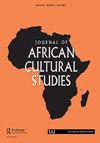外语代孕言语的民族志研究——以加纳达贡巴人的提姆帕尼鼓语为例
IF 0.7
2区 社会学
Q2 CULTURAL STUDIES
引用次数: 0
摘要
摘要本文通过对鼓点录音和录像的分析以及对鼓手的采访,对加纳达贡巴人的定音鼓节拍和阿卡里玛鼓手进行了研究。定音鼓是从18世纪的阿桑特人那里借来的,它用阿堪语传递有限的、经常重复的信息,鼓手和他的达贡巴赞助人都不懂这种语言。尽管如此,定音鼓是达贡巴文化和仪式不可或缺的一部分。除了用鼓传递信息外,akarima还保护传统和文化遗产,并强化达贡巴的价值观和文化精神。作为传统的守护者,阿卡里玛抵制与鼓的使用相关的实践创新。作为现实的建构者,他从酋长们的赞扬中创造知识和价值观,将其传授给他的赞助人,并积极塑造他们的生活以符合这些价值观。这篇文章认为,使用鼓以人们无法理解的语言传递信息远不是一个缺陷,这对akarima的成功有着重要的贡献,他是听众价值观的传授者。本文章由计算机程序翻译,如有差异,请以英文原文为准。
The Ethnography of Surrogate Speech in a Foreign Language: The Case of the Timpani Drum Language among the Dagomba of Ghana
ABSTRACT This article presents a study of the timpani drum beats and the akarima drummer among the Dagomba of Ghana, using analysis of audio and video recordings of drumming sessions and interviews with the drummers. Borrowed from the Asantes in the eighteenth century, the timpani transmits limited, oft-repeated messages in Akan, a language that neither the drummer nor his Dagomba patrons understand. In spite of this, the timpani is an integral part of Dagomba culture and rituals. In addition to transmitting messages with the drum, the akarima guards the tradition and cultural heritage, and reinforces Dagomba values and cultural ethos. As a guardian of tradition, the akarima resists innovation of the practices associated with the use of the drum. As a constructor of realities, he creates knowledge and values from the praises of chiefs, imparts them to his patrons and actively moulds their lives to conform to these values. The article argues that, far from being a deficiency, the use of the drum to transmit messages in a language not comprehensible to the people contributes significantly to the success of the akarima, who functions as imparter of values to his listeners.
求助全文
通过发布文献求助,成功后即可免费获取论文全文。
去求助
来源期刊

Journal of African Cultural Studies
Multiple-
CiteScore
1.70
自引率
10.00%
发文量
13
期刊介绍:
The Journal of African Cultural Studies publishes leading scholarship on African culture from inside and outside Africa, with a special commitment to Africa-based authors and to African languages. Our editorial policy encourages an interdisciplinary approach, involving humanities, including environmental humanities. The journal focuses on dimensions of African culture, performance arts, visual arts, music, cinema, the role of the media, the relationship between culture and power, as well as issues within such fields as popular culture in Africa, sociolinguistic topics of cultural interest, and culture and gender. We welcome in particular articles that show evidence of understanding life on the ground, and that demonstrate local knowledge and linguistic competence. We do not publish articles that offer mostly textual analyses of cultural products like novels and films, nor articles that are mostly historical or those based primarily on secondary (such as digital and library) sources. The journal has evolved from the journal African Languages and Cultures, founded in 1988 in the Department of the Languages and Cultures of Africa at the School of Oriental and African Studies, London. From 2019, it is published in association with the International African Institute, London. Journal of African Cultural Studies publishes original research articles. The journal also publishes an occasional Contemporary Conversations section, in which authors respond to current issues. The section has included reviews, interviews and invited response or position papers. We welcome proposals for future Contemporary Conversations themes.
 求助内容:
求助内容: 应助结果提醒方式:
应助结果提醒方式:


